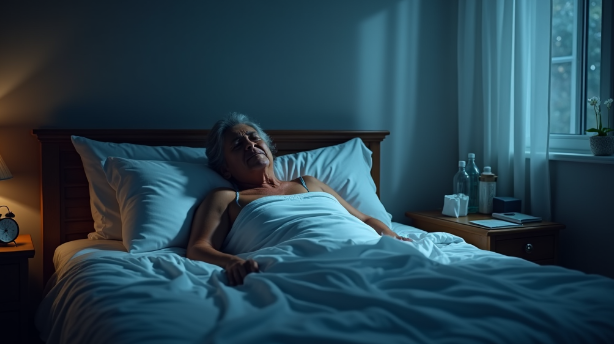Night sweats are episodes of excessive sweating that occur during sleep, often soaking through bedclothes and disrupting sleep. This common condition can affect both men and women and may be caused by various factors. Understanding the causes, symptoms, and treatment options for night sweats can help individuals manage this uncomfortable experience and improve their overall sleep quality.
Table of Contents
Key Takeaways
- Night sweats are episodes of excessive sweating during sleep
- Common causes include hormonal changes, infections, and certain medications
- Symptoms can range from mild to severe and may disrupt sleep quality
- Treatment options vary depending on the underlying cause
- Lifestyle changes and medical interventions can help manage night sweats
- Consult a healthcare provider if night sweats persist or are accompanied by other symptoms
What Are Night Sweats?

Night sweats are characterized by intense sweating during sleep that is not related to an overheated room or heavy bedding. These episodes can range from mild to severe and may occur occasionally or frequently. While night sweats are often associated with menopause in women, they can affect people of all ages and genders.
Distinguishing from Normal Sweating
It’s important to differentiate between normal nighttime sweating and true night sweats. Normal sweating during sleep can occur due to environmental factors such as a warm room or heavy blankets. Night sweats, on the other hand, are typically more severe and not easily explained by external factors.
Frequency and Intensity
The frequency and intensity of night sweats can vary greatly from person to person. Some individuals may experience mild, occasional episodes, while others may have severe, frequent night sweats that significantly impact their sleep quality and daily life.
Common Causes

Excessive sweating can be caused by a wide range of factors, from hormonal changes to underlying medical conditions. Understanding the potential causes can help individuals identify the root of their night sweats and seek appropriate treatment.
Hormonal Changes
Hormonal fluctuations are a common cause of sweats, particularly in women. These changes can occur during:
- Menopause and perimenopause
- Pregnancy
- Menstrual cycles
- Thyroid disorders
Infections and Illnesses
Certain infections and illnesses can trigger night sweats as the body fights off pathogens. Some common culprits include:
- Tuberculosis
- HIV/AIDS
- Endocarditis (heart valve infection)
- Brucellosis
- Osteomyelitis (bone infection)
Medications
Some medications can cause sweats as a side effect. These may include:
- Antidepressants
- Hormone therapy drugs
- Diabetes medications
- Some pain relievers
Medical Conditions
Various medical conditions can lead to excessive sweating, including:
- Sleep apnea
- Anxiety disorders
- Autoimmune disorders
- Certain cancers (e.g., lymphoma)
- Hypoglycemia (low blood sugar)
Symptoms Associated with Night

While excessive sweating during sleep is the primary symptom of excessive sweating, individuals may also experience other related symptoms:
Sleep Disturbances
Excessive sweating can significantly disrupt sleep patterns, leading to:
- Difficulty falling asleep or staying asleep
- Frequent waking during the night
- Feeling unrefreshed upon waking
Physical Discomfort
The excessive sweating associated with night sweats can cause:
- Damp or soaked bedding and sleepwear
- Chills or feeling cold after sweating episodes
- Skin irritation or rashes from prolonged moisture exposure
Daytime Fatigue
As a result of disrupted sleep, individuals with sweats may experience:
- Daytime drowsiness
- Difficulty concentrating
- Mood changes or irritability
Diagnosing Excessive Sweating

If you’re experiencing persistent sweats, it’s important to consult a healthcare provider for proper diagnosis and treatment. The diagnostic process may involve:
Medical History Review
Your doctor will likely ask about your symptoms, medical history, and any medications you’re taking. Be prepared to provide detailed information about your sweatings at night , including their frequency, severity, and any associated symptoms.
Physical Examination
A thorough physical exam can help identify any underlying medical conditions that may be causing your sweats.
Laboratory Tests
Depending on your symptoms and medical history, your doctor may order various tests, such as:
- Blood tests to check hormone levels, blood cell counts, and other markers
- Thyroid function tests
- Tests for specific infections or illnesses
Sleep Studies
In some cases, a sleep study may be recommended to evaluate for sleep disorders like sleep apnea, which can contribute to sweatings at night .
Treatment Options for Night Sweats

The treatment for sweatings at night depends on the underlying cause. Here are some common approaches:
Addressing Underlying Conditions
If night sweats are caused by a specific medical condition or infection, treating that condition is often the most effective way to resolve the symptoms.
Hormone Therapy
For women experiencing sweatings at night due to menopause, hormone replacement therapy may be recommended to alleviate symptoms.
Medication Adjustments
If medications are causing sweatings at night , your doctor may adjust your dosage or switch you to an alternative medication.
Lifestyle Changes
Making certain lifestyle modifications can help reduce the frequency and severity:
- Maintaining a cool sleeping environment
- Wearing breathable, moisture-wicking sleepwear
- Avoiding triggers like spicy foods, alcohol, and caffeine before bedtime
- Practicing stress-reduction techniques such as meditation or deep breathing exercises
Natural Remedies
Some individuals find relief from sweating through natural remedies, such as:
- Herbal supplements (e.g., black cohosh, sage)
- Acupuncture
- Regular exercise
- Dietary changes
It’s important to consult with a healthcare provider before trying any new supplements or alternative treatments.
When to Seek Medical Attention
While occasional night sweats may not be cause for concern, it’s important to know when to seek medical attention. Consult a healthcare provider if:
- Persist or worsen over time
- You experience unexplained weight loss or fever along with night sweats
- Significantly impact your sleep quality or daily life
- You have a history of cancer or are at high risk for certain cancers
Coping with Night Sweats
Living with night sweats can be challenging, but there are strategies to help manage the condition and improve overall comfort:
Bedtime Routine
Establishing a relaxing bedtime routine can help reduce stress and promote better sleep:
- Practice good sleep hygiene by maintaining a consistent sleep schedule
- Create a calming pre-sleep ritual, such as reading or listening to soothing music
- Avoid electronic devices before bedtime, as the blue light can disrupt sleep patterns
Environmental Adjustments
Making your sleeping environment more comfortable can help minimize the impact of sweating:
- Use lightweight, breathable bedding materials
- Keep a fan or air conditioner running to maintain a cool room temperature
- Place a towel or absorbent pad on your bed to protect your mattress
Hydration and Nutrition
Proper hydration and nutrition can play a role in managing sweating:
- Stay well-hydrated throughout the day, but limit fluid intake close to bedtime
- Avoid trigger foods that may exacerbate night sweats, such as spicy dishes or caffeine
- Consider eating smaller, more frequent meals to help regulate body temperature
Impact of Night Sweats on Quality of Life
Night sweats can have a significant impact on an individual’s quality of life, affecting various aspects of daily functioning:
Sleep Quality
Disrupted sleep due to sweating can lead to:
- Chronic fatigue
- Decreased cognitive function
- Increased risk of accidents or errors during daily activities
Emotional Well-being
The persistent discomfort and sleep disturbances associated with sweats can contribute to:
- Increased stress and anxiety
- Mood swings or irritability
- Decreased self-esteem or body image issues
Relationships
Night sweats can also affect personal relationships:
- Disrupted sleep for bed partners
- Decreased intimacy due to discomfort or embarrassment
- Strain on social interactions due to fatigue or mood changes
Prevention Strategies for Night Sweats
While not all cases of sweats can be prevented, there are steps you can take to reduce their frequency and severity:
Stress Management
Chronic stress can contribute to night sweats, so implementing stress-reduction techniques can be beneficial:
- Practice mindfulness or meditation
- Engage in regular physical activity
- Seek support from friends, family, or a mental health professional
Healthy Lifestyle Choices
Making positive lifestyle changes can help regulate body temperature and reduce the likelihood of sweats:
- Maintain a healthy weight
- Quit smoking and limit alcohol consumption
- Establish a consistent sleep schedule
Regular Health Check-ups
Staying on top of your overall health can help identify and address potential causes of sweats early on:
- Schedule regular check-ups with your healthcare provider
- Keep track of any changes in your health or new symptoms
- Stay up-to-date on recommended health screenings
Night Sweats in Different Populations
Night sweats can affect various populations differently:
Night Sweats in Men
While often associated with menopausal women, men can also experience sweats due to:
- Low testosterone levels
- Certain medications
- Medical conditions such as sleep apnea or infections
Night Sweats in Children
Night sweats in children may be caused by:
- Infections or illnesses
- Sleep disorders
- Anxiety or stress
- Certain medications
Night Sweats in Older Adults
Older adults may experience night sweats due to:
- Age-related hormonal changes
- Medication side effects
- Underlying medical conditions
Research and Future Directions
Ongoing research aims to better understand the mechanisms behind night and develop more effective treatments:
Hormone Research
Scientists are studying the complex interplay of hormones and their role in regulating body temperature and sweating patterns.
Sleep Medicine Advancements
Advances in sleep medicine may lead to new treatments for sleep disorders that contribute to sweats.
Personalized Medicine Approaches
Future treatments may involve more personalized approaches based on an individual’s genetic makeup and specific underlying causes of night sweats.
Common Triggers for Night Sweats
| Trigger | Description | Prevention Tips |
|---|---|---|
| Spicy Foods | Can increase body temperature and trigger sweating | Avoid spicy meals close to bedtime |
| Alcohol | Can cause blood vessels to dilate, leading to sweating | Limit alcohol consumption, especially in the evening |
| Caffeine | Can stimulate the nervous system and increase sweating | Avoid caffeine in the afternoon and evening |
| Hot Beverages | Can raise body temperature | Choose cool or room temperature drinks before bed |
| Stress | Can activate the body’s stress response, leading to sweating | Practice relaxation techniques before bedtime |
| Exercise | Can elevate body temperature | Avoid intense exercise close to bedtime |
| Heavy Bedding | Can trap heat and cause overheating | Use lightweight, breathable bedding materials |
| Warm Room Temperature | Can lead to overheating during sleep | Keep bedroom cool (60-67°F / 15-19°C) |
Comparison of Night Sweat Treatments
| Treatment Type | Effectiveness | Potential Side Effects | Cost |
|---|---|---|---|
| Hormone Therapy | High for menopause-related night sweats | Increased risk of certain cancers, blood clots | Moderate to High |
| Antidepressants | Moderate for some cases | Nausea, weight gain, sexual dysfunction | Moderate |
| Lifestyle Changes | Varies, can be highly effective | Minimal | Low |
| Natural Remedies | Mixed results, more research needed | Generally low, but can interact with medications | Low to Moderate |
| Cooling Products | Can provide symptom relief | Minimal | Low to Moderate |
| Cognitive Behavioral Therapy | Effective for stress-related night sweats | Minimal | Moderate |
| Acupuncture | Mixed results, may help some individuals | Minimal | Moderate |
| Prescription Medications | Effective for specific underlying conditions | Varies depending on medication | Moderate to High |
Tips for Managing Night Sweats
- Keep a sleep diary to identify patterns and potential triggers
- Use moisture-wicking bedding and sleepwear
- Keep a change of clothes and towel near your bed
- Practice good sleep hygiene
- Stay hydrated during the day
- Avoid potential triggers like spicy foods and alcohol
- Consider using a cooling mattress pad or pillow
- Talk to your healthcare provider about your symptoms and concerns
By understanding the causes of sweats and implementing appropriate management strategies, individuals can work towards improving their sleep quality and overall well-being. Feel free to visit our website or contact us now to take the first step towards a healthier, more active lifestyle! Remember that persistent or severe sweats warrant medical attention to rule out underlying health conditions and develop an effective treatment plan.


